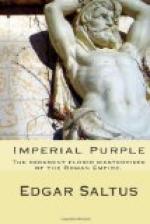When he had gone, his elder son, Bastian, renamed Aurelius Antonin, and because of a cloak he had invented nicknamed Caracalla, bounded like a panther on the throne. In a moment he was gnawing at his brother’s throat, and immediately there occurred a massacre such as Rome had never seen. Xiphilin says the nights were not long enough to kill all of the condemned. Twenty thousand people were slaughtered in twenty hours. The streets were emptied, the theatres closed.
The blood that ran then must have been in rillets too thin to slake Caracalla’s thirst, for simultaneously almost, he was in Gaul, in Dacia—wherever there was prey. African by his father, Syrian on his mother’s side, Caracalla was not a panther merely; he was a herd of them. He had the cruelty, the treachery and guile of a wilderness of tiger-cats. No man, said a thinker, is wholly base. Caracalla was. He had not a taste, not a vice, even, which was not washed and rewashed in blood. In a moment of excitement Commodus set his guards on the spectators in the amphitheatre; the damage was slight, for the Colosseum was so constructed that in two minutes the eighty or ninety thousand people which it held could escape. Caracalla had the exits closed. Those who escaped were naked; to bribe the guards they were forced to strip themselves to the skin. In the circus a vestal caught his eye. He tried to violate her, and failing impotently, had her buried alive. “Caracalla knows that I am a virgin, and knows why,” the girl cried as the earth swallowed her, but there was no one there to aid.
Such things show the trend of a temperament, though not, perhaps, its force. Presently the latter was displayed. For years those arch-enemies of Rome, the unconquerable Parthians, had been quiet; bound, too, by treaties which held Rome’s honor. Not Caracalla’s, however; he had none. An embassy went out to Artobane, the king. Caracalla wished a bride, and what fairer one could he have than the child of the Parthian monarch? Then, too, the embassy was charged to explain, the marriage of Rome and Parthia would be the union of the Orient and the Occident, peace by land and sea. Artobane hesitated, and with cause; but Caracalla wooed so ardently that finally the king said yes. The news went abroad. The Parthians, delighted, prepared to receive the emperor. When Caracalla crossed the Tigris, the highroad that led to the capital was strewn with sacrifices, with altars covered with flowers, with welcomings of every kind. Caracalla was visibly pleased. Beyond the gates of the capital, there was the king; he had advanced to greet his son-in-law, and that the greeting might be effective, he had assembled his nobles and his troops. The latter were armed with cymbals, with hautbois, and with flutes; and as Caracalla and his army approached, there was music, dancing and song; there were libations too, and as the day was practically the wedding of East and West, there was not a weapon to be seen—gala robes merely, brilliant and long. Caracalla saluted the king, gave an order to an adjutant, and on the smiling defenceless Parthians the Roman eagles pounced. Those who were not killed were made prisoners of war. The next day Caracalla withdrew, charged with booty, firing cities as he went.




